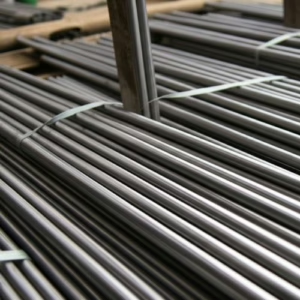8Cr3 Hot Work Tool Steel Properties and Applications
8Cr3 Tool Steel is a reliable, high-carbon hot work tool steel commonly used in various applications. It is essentially a modified T8 carbon tool steel, improved by adding 3.20% to 3.80% chromium (Cr).

1. 8Cr3 Tool Steel Composition
The chemical composition of 8Cr3 Tool Steel, according to the GB/T 1299-2000 standard, is as follows:
- Carbon (C): 0.75% to 0.85%
- Silicon (Si): ≤ 0.40%
- Manganese (Mn): ≤ 0.40%
- Chromium (Cr): 3.20% to 3.80%
- Phosphorus (P): ≤ 0.030%
- Sulfur (S): ≤ 0.030%
- Copper (Cu): ≤ 0.030%
2. Basic Properties
- Chromium Enhancement: The added chromium increases hardenability and provides moderate resistance to elevated temperatures (up to approximately 500°C).
- Wear Resistance: 8Cr3 offers good wear resistance. This is due to the formation of fine, uniformly distributed carbides in its microstructure, which is important in applications involving friction and abrasion.
- Strength: The steel maintains adequate strength at both room temperature and moderately high temperatures.
3. 8Cr3 Tool Steel Heat Treatment and Hardness
Correct heat treatment is critical to maximize the performance of 8Cr3 Tool Steel.
3.1 Annealing
- Delivered Condition: Typically supplied in an annealed state.
- Hardness: 207 to 255 HBW (Brinell Hardness). This softer state makes machining easier.
3.2 8Cr3 Tool Steel Hardening and Tempering
- Hardening: Austenitize between 830°C and 880°C, followed by oil quenching.
- Achieved Hardness (Post-Quench): Generally exceeds 55 HRC (Rockwell Hardness C), often reaching 59 to 62 HRC.
- Tempering: Essential after quenching to reduce brittleness and achieve the right balance of hardness and toughness. Tempering is usually done between 480°C and 520°C.
- Working Hardness (Post-Temper): Approximately 41 to 46 HRC.
- Caution: Tempering between 460°C and 480°C may reduce impact toughness; consider this when using high-toughness applications.
3.3 Surface Treatment (Nitriding)
- Purpose: For applications needing enhanced surface durability.
- Process Example: Nitriding at around 480°C for 50 hours.
- Result: Creates a surface layer of 0.35 to 0.4 mm depth with a microhardness of 600 to 750 HV (Vickers Hardness).
3.4 Critical Temperatures
Understanding these temperatures is key for successful heat treatment:
- Ac1: ~785°C (Start of austenite formation on heating)
- Ac3: ~830°C (End of austenite formation on heating)
- Ar1: ~750°C (Start of austenite decomposition on cooling)
- Ar3: ~770°C (End of austenite decomposition on cooling)
- Ms: ~370°C (Start of martensite transformation)
- Mf: ~110°C (End of martensite transformation)
4. 8Cr3 Tool Steel Processing Recommendations
Follow these guidelines for optimal processing.
4.1 Hot Working (Forging)
- Heating: Heating ingots/billets to 1180°C – 1200°C.
- Forging Start Temperature: 1100°C – 1150°C.
- Forging Finish Temperature: Not below 800°C – 900°C.
- Cooling: Slow cooling after forging is important to prevent internal stress.
4.2 Annealing for Machinability
- Process: Heat to 790-810°C, hold for 2-6 hours, then cool in the furnace to below 600°C.
5. 8Cr3 Tool Steel Applications
8Cr3 steel is suitable for tools and dies used under these conditions:
- Temperature: Moderate working temperatures (below 500°C).
- Loads: Relatively low impact and vibration.
- Primary Requirement: Wear resistance.
Specific examples include:
- Hot trimming dies (for removing flash from forgings)
- Forming punches (for shaping heated materials)
- Bolt hot upsetting dies
- Hot piercing dies
- Die sleeves
- Punches
Considerations:
- For hot blanking requiring significantly higher wear resistance, cemented carbide might offer longer life. However, 8Cr3 is an economical choice for less demanding hot blanking tasks.
- For large-scale production (e.g., automotive gears) where standard 8Cr3 dies might fail early, consider composite die designs with higher-performance inserts.
Aobo Steel Expertise
8Cr3 steel offers a suitable balance of wear resistance and performance at moderate temperatures for specific hot work tooling applications. Achieving the best results depends heavily on correct processing and heat treatment, following the parameters outlined above.
At Aobo Steel, our decades of experience in tool steel forging and supply enable us to understand the nuances of materials like 8Cr3. We provide high-quality steel and the expertise to help you utilize it effectively. Contact us to discuss your specific application needs.
Explore Our Other Products
D2/1.2379/SKD11
D3/1.2080/SKD1
D6/1.2436/SKD2
A2/1.23663/SKD12
O1/1.2510/SKS3
O2/1.2842
S1/1.2550
S7/1.2355
DC53
H13/1.2344/SKD61
H11/1.2343/SKD6
H21/1.2581/SKD7
L6/1.2714/SKT4
M2/1.3343/SKH51
M35/1.3243/SKH55
M42/1.3247/SKH59
P20/1.2311
P20+Ni/1.2738
420/1.2083/2Cr13
422 stainless steel
52100 bearing steel
440C stainless steel
4140/42CrMo4/SCM440
4340/34CrNiMo6/1.6582
4130
5140/42Cr4/SCR440
SCM415
🔥 Limited-Time Offer: Get Instant Quote + Free Technical Consultation on 8Cr3 Tool Steel
Are you looking for a reliable supplier of 8Cr3 Tool Steel?
Aobo Steel offers:
✅ Over 20 years of forging experience
✅ Stable supply chain with 40+ long-term partners
✅ Full chemical & mechanical test reports provided
✅ Fast lead time and global shipping
✅ Expert support for heat treatment & machining guidance
